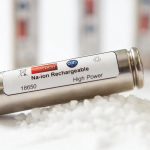The green economy has become a top priority as we look for ways to reduce our environmental footprint. Lithium batteries play a crucial role in this transition to cleaner energy. In this article, we’ll explore how lithium batteries contribute to the green economy by reducing energy costs. From capturing renewable energy to using it efficiently, learn how these batteries are shaping a more sustainable energy future.
 Green economy thanks to lithium batteries:
Green economy thanks to lithium batteries:
Lithium batteries play a critical role in achieving the green economy by enabling a more efficient and sustainable use of energy:
1. Renewable Energy Storage:
Renewable energy, such as solar and wind power, is inherently intermittent. Lithium batteries allow the energy produced during periods of high production to be stored for later use, ensuring maximum use of renewable energy.
2. Energy Demand Balancing:
Lithium batteries can provide power quickly during spikes in demand. This reduces pressure on the power grid during peak hours, avoiding outages and the costs of adjusting production. Energy demand balancing is another major strength of lithium batteries. Imagine a big sporting event where thousands of people flock to a stadium. The simultaneous use of electrical appliances can cause a spike in energy demand. In this case, lithium batteries can step in to provide the necessary power, avoiding power surges or breakdowns. In addition, by reducing transmission-related energy losses, as is the case in large areas such as Canada where distances between energy sources and residential areas can be considerable, they maximize the efficiency of electricity distribution.
3. Reduction of energy losses:
Energy storage in lithium batteries reduces the losses associated with transporting electricity over long distances. This improves the overall efficiency of the energy system and contributes to a greener economy.
4. Promotion of electric vehicles:
Cities like Oslo in Norway are leading the way in promoting the use of electric vehicles powered by lithium batteries. These cars, in addition to reducing greenhouse gas emissions, generate less noise and pollution, thus contributing to a cleaner and quieter urban environment. Through these initiatives and the growing adoption of lithium batteries, we are making progress towards a greener and more environmentally friendly economy. Lithium batteries are also used in electric vehicles, reducing reliance on fossil fuels and greenhouse gas emissions. This contributes to the fight against climate change and the creation of a more sustainable economy.
5. Reduced Maintenance Costs:
Lithium battery technology has revolutionized not only the way we use energy, but also the way we maintain it. This is because the maintenance of these batteries is often simpler and less expensive than that of traditional energy storage solutions. For example, unlike lead-acid batteries, lithium batteries do not need to be regularly checked for their water level or manually balanced. In addition, their longer lifespan means that replacement cycles are less frequent.
Companies that have chosen this technology for their backup power systems or solar installations can attest to this: technical interventions are less common, and when they are needed, they are often less cumbersome. This is the case, for example, in some data centers that have adopted lithium battery storage, where operators are seeing a decrease in unplanned downtime.
As a result, not only do lithium battery owners save money by avoiding costly interventions, but they also benefit from increased peace of mind knowing that their systems are more reliable and require less attention. Thus, switching to lithium batteries is not only an eco-friendly decision, but also economically sensible in the long run.
FAQ’s
How do lithium batteries store renewable energy?
Lithium batteries store renewable energy by converting electricity generated by sources like the sun and wind into chemical energy, which can be stored and released later.
How do lithium batteries support the green economy?
Lithium batteries support the green economy by enabling more efficient use of renewable energy, reducing energy losses, and encouraging the adoption of electric vehicles.
Are lithium batteries environmentally friendly?
Lithium batteries are more environmentally friendly than older technologies, as they reduce dependence on fossil fuels and reduce greenhouse gas emissions.
Are energy storage systems suitable for homes and businesses?
Yes, lithium battery-based energy storage systems are suitable for homes, businesses, and even industrial facilities, providing a flexible solution to optimize energy use.
How do I know if lithium batteries are right for my needs?
Consult with an energy professional to assess your specific needs and determine if lithium batteries are right for your situation. They can guide you on the proper battery capacity and potential benefits.
What are the long-term savings associated with lithium batteries?
In addition to the savings resulting from more efficient use of energy, lithium batteries have lower maintenance costs compared to other technologies, resulting in savings in the long run.
Conclusion:
Lithium batteries play a central role in the transition to a greener economy by enabling more efficient and sustainable use of energy. From promoting renewable energy to reducing energy losses and creating a more resilient energy infrastructure, these batteries contribute to a more sustainable and environmentally friendly energy future. By investing in these technologies, we can not only reduce our energy costs, but also take an important step towards achieving our sustainability goals.
Conclusion
Grants and funding options play a crucial role in the promotion and adoption of battery technologies. By reducing financial barriers, these programs encourage the use of sustainable energy solutions and contribute to the achievement of the green economy. Whether for households or businesses, access to affordable battery technologies paves the way for significant energy savings and a reduced carbon footprint. By seizing these opportunities, we can all contribute to creating a cleaner and more sustainable energy future.



